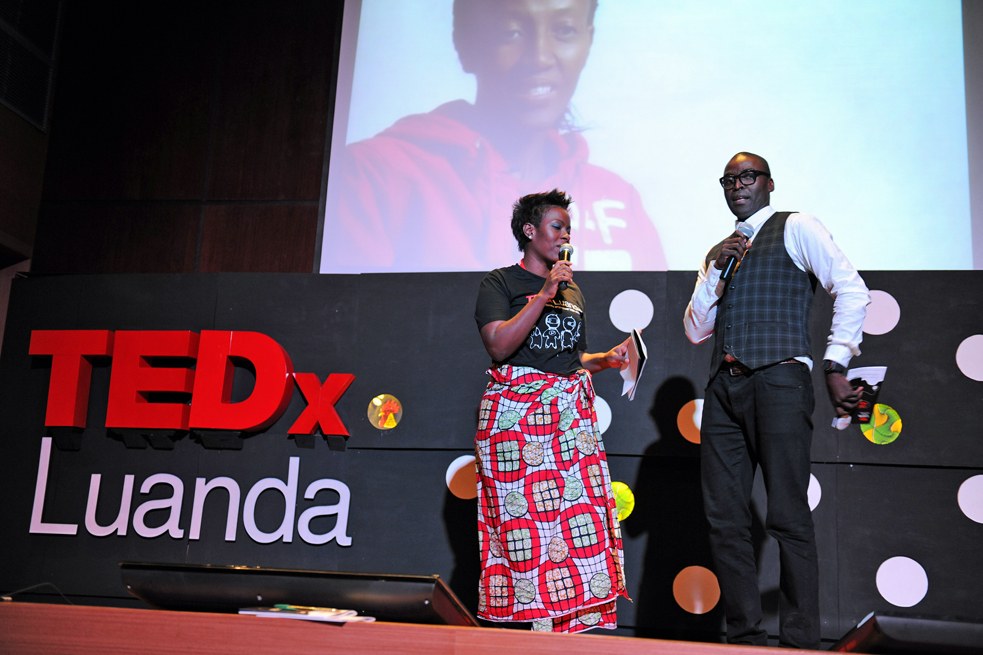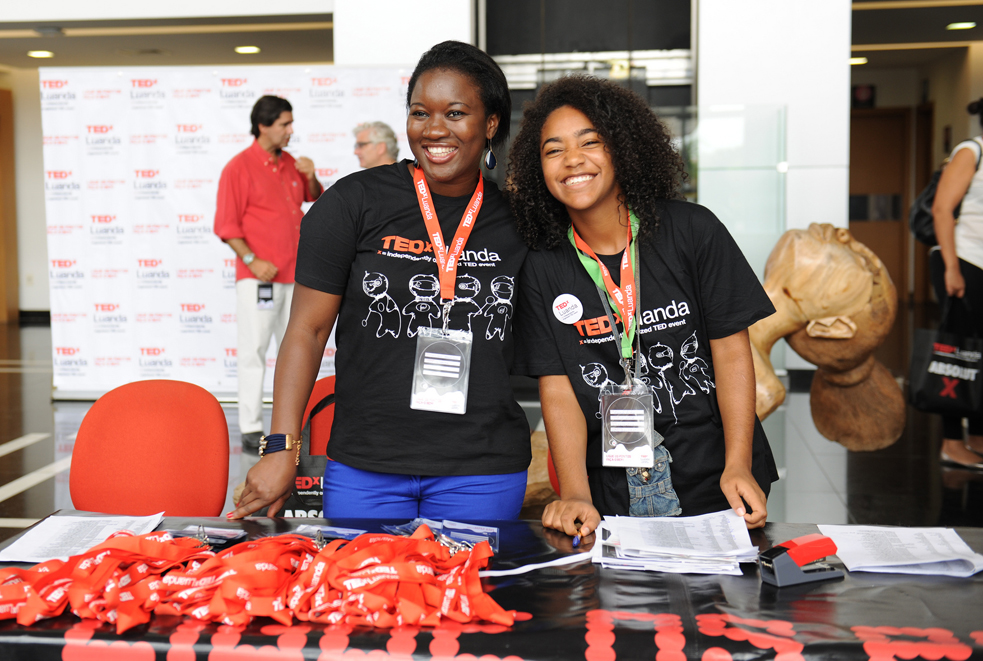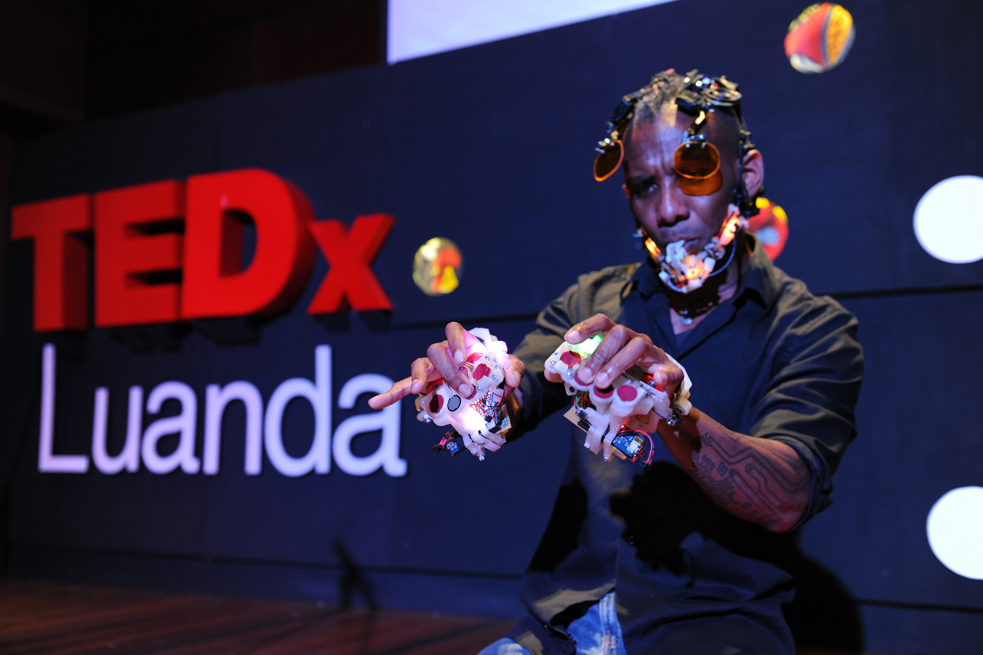
TEDxLuanda is the only TEDx event in Angola and its theme always hinges on the country’s future. Organizer Januario Jano (on the right) co-hosts in 2013, introducing speakers on the theme “Connect the Dots.” Photo: Midan Studio
Luanda, the capital of Angola, is a city of stark contrasts. An oil-rich economy draws tons of wealthy expatriates to its center, while the very poor swarm around its outskirts. An antiquated government limps along as a young, educated and global-minded new guard begins to gain their foothold. Even the skyline is changing; everything’s growing upwards as skyscrapers of cement and glass replace flatlands. Memories of a civil war are still fresh, but the country also vibrates with a fusion of cultures— diverse African ethnic groups mixed with European and Latin American immigrants, and all of them speaking Portuguese.
With so much in flux, Luanda is in the midst of an identity crisis. Emerging from somewhere in the middle of it, designer and artist Januario Jose is hoping to connect the divides and start building a new future for Luanda—and Angola at large—beginning with TEDxLuanda.
The idea for TEDxLuanda was seeded miles away from Angola in a city that might just be called Luanda’s complete opposite—London. Jose left his hometown to attend university there, and in London he was invited to watch TED Talks with a group of friends. He treasured this feeling of community pulled together around ideas. Shortly after getting his degree, he returned to Luanda to begin his design career. As he began holding informal design events, he noticed how foreign the concept of design was to his community. He also noticed that there were other knowledge gaps. At the same time, he could sense the community’s collective potential and thirst for a new, modern Luanda and a brighter future for Angola.
“I wanted to do something here that could engage the audience and challenge them to start thinking and acting instead of complaining,” he says. He wanted to set up a platform to showcase and encourage the work of the young creators and thinkers. TED felt like the best starting point because students already knew it. Local businessmen, “in their ties and gray suits,” knew it too.
TEDxLuanda is the only TEDx event in Angola. And Jose defines its main purpose as nurturing the upcoming generation. But Jose hopes that the older generations can also learn from the ideas and solutions presented there too. Instead of dwelling in the past, the event aims to give a lens to see what Luanda can strive to be. When recruiting volunteers and attendees, Jose goes to universities to source the bright-eyed, the hungry and the passionate. The reason he says he does this—because a whole new generation is growing up without the weight of war and without the forced perception of identity it brought along with it.

TEDxLuanda volunteers pose excitedly at the welcome table. Photo: Midan Studio
For many, Angola’s decades-long civil war was the only reality they’ve ever known. The war ended just over 10 years ago, in 2002, so even Jose grew up with its ruins in the backdrop. Meanwhile, the government has changed little in his lifetime. Jose has found himself fascinated with the questions: What can a country become when it’s no longer stuck in perpetual divisiveness? How do the people craft a sustainable, collective identity—one that transcends a wartime state-of-mind?. He says, “We need change so badly. We need to get some fresh air through this system. The old system is still corrupted. The world is dynamic; it’s opening up.”
All of Jose’s TEDx events have hinged around this common theme: Angola’s future.
The novelty of TEDxLuanda has pushed it into the media spotlight, and the percolating noise and conversation around change have sometimes reached the ears of people who are not so keen on having traditions disrupted. Jose worries that any kind of talk about modern political systems could perturb government regulators. So, he takes extra care to make sure the event is apolitical. But personally, Jose, and a great number of individuals in his world, believe that the Angolan government, while more flexible than in the past, is still too set in its ways and need to learn how to adapt to the changing needs of the community. Because they only recently transitioned from a poor to an extremely rich state, they don’t know how to spend money wisely, he says. Strangely, the venues Jose booked for both of his TEDx events mysteriously shut them out at the very last minute with only a murky, half-hearted explanation: “It was not up to us.” For these events, he had to scramble to find a new venue just weeks before they were set to happen. Though he casts no blame, he insinuates that there are individuals who are not pleased by the cultural and political shifts that are on the rise.
As any TEDx organizer can tell you, putting together an event with hundreds of moving parts is no small feat. Although the reception of TEDx in Angola has been huge and enthusiastic, this same intensity has left Jose feeling a bit burned out. After wrapping up another successful TEDx event earlier in June, he’s felt pressure to produce his next event and to expand his reach to other cities in Angola. But so far, he’s been a one-man team with only a few helpful volunteers here and there. He wishes he had a permanent core team that stayed with him throughout the year. Next year, he is considering a break in order to find that superstar group to help continue the spread of ideas. Jose believes the people of Luanda have already proved that they are craving a new mode of thinking. It’s now up to them to provide the muscle to help it continue to prosper. “Organizing [TEDxLuanda] has helped me be a role model to the Angolan youth,” he says. “If I leave, I want them to take it on and keep doing it.”
In spite of being physically exhausted, Jose persists because he believes that a platform that connects the creative community is necessary as Angola begins to rewrite its narrative. At the very least, TEDxLuanda is a symbol for innovation and evolution. But, the true impact of TEDxLuanda can be seen in the spinoff of three other TEDx events in Portuguese-speaking African cities in surrounding countries—TEDxMaputo in Mozambique, TEDxSãoTomé in São Tomé and Principe and TEDxPraia in Cape Verde.
Luanda’s story is a thread in a larger tapestry. It’s not just Luanda or Angola that’s reaching for something greater. It’s all of Africa. Jose compares his path with other young Africans who’ve left their homes to get an education in Europe or the US and then have returned back to their country to live and work. From Jose’s perspective, there doesn’t seem to be any room to make an impact in Europe and the US; everything’s already been done and hardly anything is relevant. But in Africa, there is so much room for change and every solution is necessary.
“Africa has a future. This is the time it’s rebuilding its image,” he says. “It is a great challenge for people who like challenges, like me—for people who like to dig their hands in to make a difference. This is the perfect place to be right now.”

Onyx Ashanti, a sci-fi obsessed electronic jazz artist, takes the stage. Photo: Midan Studio
Comments (6)